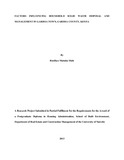| dc.description.abstract | Despite the Local County Government effort to clean up the Town of Garissa, the garbage
accumulation situation in the residential and entire town continues to worsen day after day. The
situation is made even worse by the presence of plastic bottles and polythene papers which are
visible in every part of the town. Besides that, piles of garbage are seen in many areas outside
residential areas and these become an eyesore to visitors coming to Garissa for the first time.
Further, the concentration of population and business activities in the town and the
accompanying of rapid increase in the volume of solid waste generated from production and
consumption activities have led to the prevailing situation.
This study investigated the factors influencing disposal and management of household solid
waste in Garissa Town of Garissa County, Kenya. The objectives of the study were; to determine
how various methods of waste disposal and management are impacted by the levels of
education/awareness, to investigate the influence of location of Household on disposal of solid
waste, and to investigate the influence of garbage disposal facilities/technologies on disposal and
management of solid waste. Descriptive survey was used as a research design for this study
while cluster, purposive and random sampling techniques were used to select the sample.
A sample of 400 respondents was used for this study. A questionnaire was used as the main
instrument for collecting data for this study although guided interviews and observation was also
used to gather knowledge and information. Data collected was analysed using SPSS package and
then it was presented by use of frequency and percentage Tables. The study found that the
residents of Garissa Municipality are not aware of any outlined method and responsibility of
waste management adopted by the authorities for keeping the Municipality clean. There is no
specific way of waste disposal and management which can be called the norm or best practise for
the Municipality’s Households . As such therefore there is no such a way of doing things and
which has been sensitized to the residents. From the study also, it was is also found that there
was nothing to show any relationship between household location and amount of waste
produced. From the findings, it was found that different households living in different residential
areas generated different quantities of waste depending on their sizes rather than their location.
From the findings also, it is also clear that there is no adequate waste disposal
mechanism/technologies/facilities available to most residents living in Garissa Township.. As
such, most household waste are scattered all over residential places, giving a bad image to the
environs of the Municipality . Further, surface dumping of household waste is the most common
form of waste disposal applied by residents. Other methods include burning and burying in the
ground, though burying of domestic waste is quite rare.
The study recommends that, Garissa town county government should put up designated waste
dumps in all residential areas so as to ensure that residents do not scatter their household waste
all over the place as they currently do. If dumping places are available, people would see the
sense of taking their waste to the designated places rather than throw them all over the place as
they currently do. Residents of Garissa Township should be sensitized to stop depositing their
waste near residential areas as this exposes them to the danger of contracting diseases. Instead,
the council should designate specific places for waste deposit and collection. The local council
should contract the private waste collectors to extend the services they currently provide to the
shop owners operating along the main streets to residential areas. This would reduce the amount
of garbage in the residential areas. | en |

